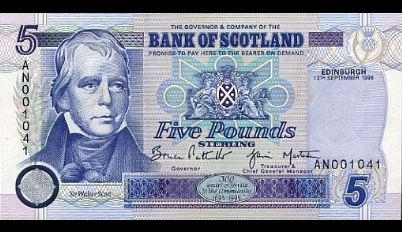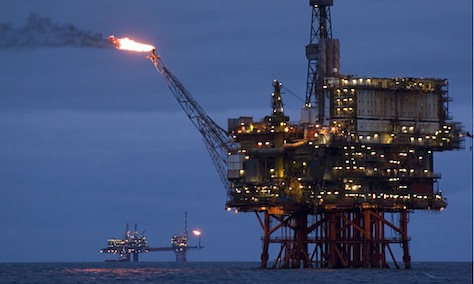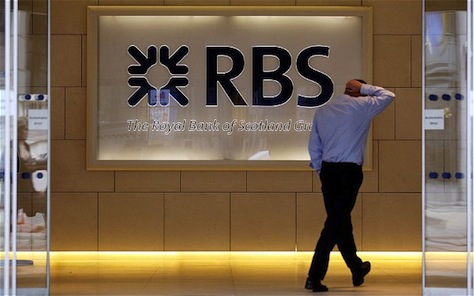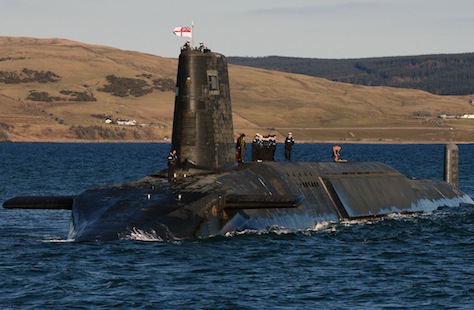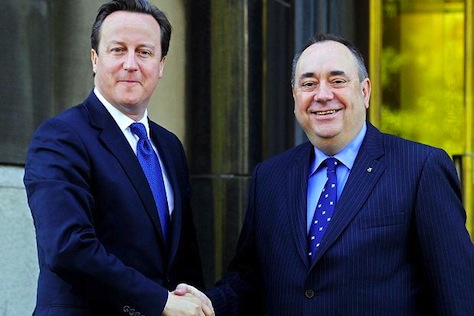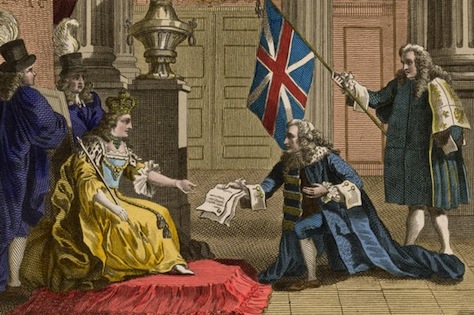Today, residents of Scotland, a region of 5.3 million people, will vote in referendum that’s been scheduled for 19 months, and that will ask one simple question:![]()
![]()
Should Scotland be an independent country?
The answer could change the economic, social and cultural outcomes of the lives of both English and Scottish residents for generations to come.
With polls set to open shortly, Suffragio looks at ten policy (and other) issues that Scots are considering as they cast their ballots, either to become an independent state or to remain part of the United Kingdom.
1. Currency
Scottish first minister Alex Salmond has argued throughout the campaign that an independent Scotland would be able to retain the British pound as its currency. Economists have argued over whether that would actually be the best policy for Scotland, because it would mean immediately giving up control over monetary policy.
* * * * *
RELATED: Why would an independent Scotland
even want to keep the pound?
* * * * *
But Conservative chancellor George Osborne has (so far) refused to consider the notion that Scotland would be able to join a currency union with the rest of the United Kingdom. Salmond has hinted that, in lieu of a formal currency union, Scotland might instead simply adopt the pound anyway — a process economists call ‘Sterlingisation.’ That’s an easier option, but it would give Scotland even less of a voice on monetary policy. Mark Carney, the governor of the Bank of England warned last week that Scotland today wouldn’t have enough foreign reserves to pursue that policy.
For now, Salmond seems as opposed to joining the eurozone as he does to creating a new Scottish currency. Given the cross-border trade between England and Scotland, however, there are good reasons for London to reconsider its stand on a currency union, though no one knows what the government’s position will be after the referendum. Of all the risks involved with independence, this is certainly one of the cloudiest, due in no small part to the way that both sides have grand-standed over the issue.
Advantage: Union.
* * * * *
2. EU Membership
One of the bogeymen of the independence campaign has been that if Scotland goes it alone, it might find itself shut out from international organizations like the North Atlantic Treaty Organization (NATO) and the European Union.
* * * * *
RELATED: How an independent Scotland could enter the EU
* * * * *
While EU membership will not ne (and probably should not be) automatic under the EU treaties, Scotland has been part of the European Union since 1972, when the United Kingdom first joined the European Economic Communities. As such, Scotland has laws generally compatible with EU law, and its accession should be among the easiest expansions in EU history.
That doesn’t mean there will not be complications. Scotland would have to find a way around the Treaty of Maastricht, which would otherwise compel it to join the eurozone. Scotland would also want to opt-out, if possible, from the Schengen zone, to maintain open borders with the rest of the United Kingdom and Ireland. As a result, it might lose the benefits of the ‘rebate’ that UK prime ministers have been clawing back since the 1980s, or be forced to choose between Europe and the rest of the United Kingdom, which may vote in 2017 to withdraw from the European Union.
Conceivably, Scotland accession would be subject to veto by any of the 28 EU member-states, including Spain, where prime minister Mariano Rajoy is worried about his own Catalan separatist threat. Nevertheless, incoming European Commission president Jean-Claude Juncker has indicated that he won’t leave Scotland adrift.
Advantage: Independence.
* * * * *
3. Further Devolution
The last days of the campaign have been met with fevered pitches from Conservative prime minister David Cameron, Labour leader Ed Miliband, former Labour prime minister Gordon Brown and others that the Westminster political establishment will, in the event of a ‘No’ vote, deliver greater autonomy to Scotland before the next general election.
* * * * *
RELATED: If Scotland votes ‘No,’ what will devolution-max entail?
* * * * *
But there’s no indication that Scotland has maximized the devolved powers that it currently has. Even though it can vary the rate of Scotland’s basic income tax either 3% higher or lower than UK income tax, no government has done so in the 15 years since the Scottish parliament was first established at Holyrood. Under additional devolution enacted in 2012, the tax rate could vary up to 10%, starting in 2016.
Moreover, the suggestion that Cameron could push through greater autonomy without reducing the funding that Scotland currently receives has already launched a backlash among English MPs who think it’s unfair for all sorts of reasons. There’s no guarantee that, facing his own tough reelection in eight short months, Cameron will be in a position to deliver.
Advantage: Independence.
* * * * *
4. North Sea Oil
No one knows exactly how much oil Scotland would have as an independent country, but one report suggests that it would inherit nearly 85% of the current UK oil reserves.
It’s the difference between Scotland becoming like Norway, an oil-wealthy social welfare state that sets aside its oil proceeds in one of the world’s largest stabilization funds, and Iceland, which nearly went bust when its banks collapsed during the 2008 financial crisis, turning a generation of would-be financiers into fishermen.
What’s scarier is that the North Sea oil is running out. According to the BBC, there could be as much as £1.5 trillion in oil revenue left or as little as £120 billion. What’s certain is that while oil proceeds currently constitute just 1.5% of total UK revenue, they would represent a far greater proportion, between 10% to 20%, of Scottish revenue, making Scotland much more vulnerable to global market forces.
Ultimately, Scotland’s economy won’t be secure unless its leaders can show it can be more diversified. Any number of shocks, including greater renewable resource investment, US energy independence through fracking and shale gas, discovery of additional offshore reserves in Brazil or elsewhere, or a Chinese or global economic slowdown, could place significant downward pressure on oil prices — and send Scotland into economic misery.
The discovery of North Sea oil in the 1970s coincided with the initial rise of the Scottish National Party (SNP), so the promise of oil wealth has always played an outsized role in the mythology of a sovereign Scottish state. But that doesn’t change the fact that this is an incredibly weak limb upon which to rest the case for independence.
Advantage: Union.
* * * * *
5. Democratic Politics
 Photo credit to Jeremy Sutton-Hibbert.
Photo credit to Jeremy Sutton-Hibbert.
It’s no secret that Scotland has increasingly grown more leftist than the rest of the United Kingdom (or at least England). While Scotland’s leftist tilt is often overstated in what remains a fundamentally conservative society, it’s true that in the last general election, Scots elected exactly one Conservative MP and 41 Labour MPs.
* * * * *
RELATED: Who is Nicola Sturgeon?
Meet the star of the SNP’s rising generation
* * * * *
Scots famously scorned Tory prime minister Margaret Thatcher for her neoliberal policies that were viewed as devastating to Scottish industry, and her decision to institute a flat-rate ‘community charge,’ or ‘poll tax,’ initially in Scotland in 1989 before expanding the unpopular tax to the rest of the country nearly destroyed what little was left of the Tory brand north of the Tweed. Similarly, Scottish voters dislike the budget cuts and ‘austerity’ politics of Cameron’s current government.
But even during the Labour governments of former prime minister Tony Blair and Gordon Brown, both of whom were born in Scotland, many Scots opposed British participation in the US-led occupation of Iraq, and Blair’s first foreign minister, the Scottish-born Robin Cook, would become one of the government’s loudest critics of the Iraq war before his death in 2005.
The argument that an independent Scotland would elect leaders more responsive to Scottish public opinion and Scottish policy values might be the most compelling argument that the ‘Yes’ camp has deployed, and there’s no doubt that devolution (and the current referendum) has engendered a much stronger culture of democratic engagement throughout Scotland.
Beyond Salmond, who can sometimes tend toward the pugilist, Scotland would fare well under any of its current major party leaders. Deputy first minister Nicola Sturgeon, Salmond’s heir apparent (no matter the referendum results), is possibly more highly regarded than Salmond. But Scottish Labour leader Johann Lamont, Scottish Conservative leader Ruth Davidson and Scottish Green co-chair Patrick Harvie are all highly regarded.
Advantage: Independence.
* * * * *
6. Fiscal Matters
As I wrote above, the big economic question is whether Scotland will be more like Iceland or more like Norway. There’s a lot of risk and uncertainty involved with independence from an economic standpoint, including the currency issues, the risk of repatriation of Scottish companies and banks in London (including the Royal Bank of Scotland, which, in any event, is 80% owned by the British government) and the risks for homeowners who would, overnight, be paying mortgages to foreign banks.
Scotland would, presumably, assume some proportional amount of the current UK public debt. But the exact amount will not be clear until negotiations, and the BBC estimates that it could fall anywhere between £56 billion (38% of estimated Scottish GDP) and £92 billion (62% of estimated Scottish GDP).
That doesn’t even begin to count other unforeseen risks — is it realistic, for example, to expect a run on Scottish banks on Friday or in March 2016?
Salmond’s economic scheme for a social democratic state also depends on having enough oil revenues to realize that dream. If not, Scotland might end up having to embrace even more neoliberal policies than the rest of the United Kingdom, like Ireland and The Netherlands have done in recent years, pushing to attract foreign capital and employers seeking highly-educated, English-speaking workforce.
In short, if Salmond is wrong, Scotland might in the coming years be forced to return to its 19th century entrepreneurial, libertarian roots. That, all things considered, might not be so bad, because independent Scotland in 10 or 20 years might be less Sweden or Norway or Greece or Iceland, and more like Ireland, or even like Scotland today.
Advantage: Toss-up.
* * * * *
7. Defense and Foreign Affairs
Salmond and the pro-independence camp argue that one of the benefits of sovereignty would be compelling the rest of the United Kingdom to remove the Trident nuclear deterrent — i.e., removing the British nuclear-armed submarines from Clyde Naval Base off the western coast of Scotland. They also argue that an independent Scotland wouldn’t be yoked into the foreign misadventures that Great Britain sometimes finds itself, including the Iraq war and the NATO mission to support rebels in Libya three years ago.
* * * * *
RELATED: After independence: the road ahead for an independent Scotland
* * * * *
While Scotland would almost certainly join NATO, Salmond hasn’t said how an independent Scotland would afford its own defense, in a world where Islamic terrorism and Russian aggression top the European security agenda.
What’s more, if Scotland couldn’t afford to defend itself adequately, it could leave the northern third of Great Britain vulnerable to attack, leaving the rest of the United Kingdom less secure than before.
Advantage: Union.
* * * * *
8. Orkney and Shetland Islands
Live by the principle of self-determination, die by the principle of self-determination.
If Scotland’s voters opt for independence today, it will be without the votes of many residents of the Orkney and Shetland Islands, which lie to the north and northeast of the Scottish highlands in the North Sea.
Staunchly unionist and solidly Liberal and/or Liberal Democratic in their politics for decades, the Northern Isles are among the least enthusiastic about independence, which would be a problem for a country that hopes North Sea oil will anchor its short-to-medium-term economic strategy.
One of the most under-apppreciated risks of independence is that the Orkney and Shetland Islands, though home to around just 44,000 people, could opt out of a sovereign Scottish state. Separated by water, the Northern Isles have a unique culture that could resist joining a Scottish state.
Alistair Carmichael, the MP for Orkney and Shetland and Cameron’s secretary of state for Scotland, argued this week that the islands could decide to become a self-governing crown dependency like the Isle of Man, an island of 85,000 that lies in the Irish Sea between Great Britain and Northern Ireland.
That’s result that could prove disastrous for a newly sovereign Scotland — in terms of both oil revenues and morale.
Advantage: Union.
* * * * *
9. International Standing
An independent Scotland would lose any claim to being a permanent member of the United Nations Security Council, it’s true. But as a region with just over 8% of the population, Scotland doesn’t exactly direct UK foreign affairs. That didn’t stop Ukraine, Estonia and 13 other Soviet republics from leaving the Soviet Union in 1991, and it’s worth hazarding a guess that it’s not a major factor in Taiwan’s resistance to reunification with China, either.
* * * * *
RELATED: Why the US needs to start thinking about a Scottish policy
* * * * *
Otherwise, Scotland has much to gain from independence. Edinburgh would immediately become a European capital, with all the pomp of a capital city’s embassies and government offices. Edinburgh is already among the top 15 EU financial centers, and might be expected, over time, to become a greater counterweight to London, in the same way that Dublin has attracted foreign investment and financial services.
Dublin, by the way, is an indisputably more cosmopolitan city today as a national capital than it would have been as a regional capital under the greater British union. The same goes for Oslo, the capital of Norway, which split from Sweden in 1905. By contrast, imagine how much more important St. John’s might be today as the capital of a sovereign Newfoundland, had it not become part of Canada in 1949.
As an independent country, Scotland might also be able to triangulate the rest of the United Kingdom against the United States. After all, with up to 25 million Americans of Scottish descent, Scotland would inherit at least some of the ‘special relationship’ that the United States and the United Kingdom currently enjoy.
Advantage: Independence.
* * * * *
10. Scotland’s History in Great Britain
Three-hundred and seven years is a long time, and Scotland and England share a combined history that predates both the 1707 Acts of Union that created the British union and the 1603 Union of the Crown, when Elizabeth I passed on the English crown to James VI of Scotland.
In those 307 years, the ‘rose’ and the ‘thistle’ have been through a lot together, including the creation and loss of a global empire, two World Wars, and innumerable contributions to world history from almost the immediate outset of their 18th century union. Many of those accomplishments have their dark sides — e.g., the horrors of modern warfare, and the racism and slavery that colonization wrought.
But many of those accomplishments had their genesis in Scotland, including the Enlightenment, the Industrial Revolution, and the creation of modern economics (Adam Smith) and modern political philosophy (David Hume). Scotland has a unique history in its own right, irrespective of England (notwithstanding its failed two-year effort at forming ‘New Caledonia’ in what is today Panama).
As Tom Devine, Scotland’s leading historian has argued, many of the forces that once fused England and Scotland, such as Protestantism, empire and naval trade, have long ago faded.
Ultimately, the history of English-Scottish relations is a complicated thing, and each voter will have a different reference point, which could be anything from Bannockburn to Dunkirk.
Advantage: Toss-up.

